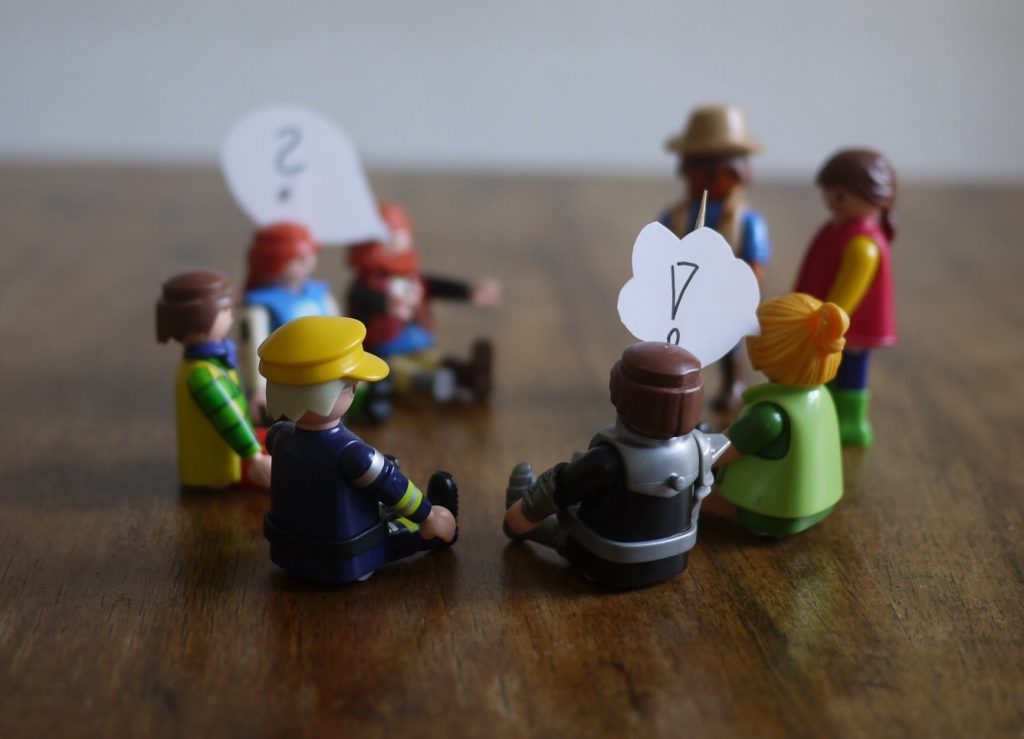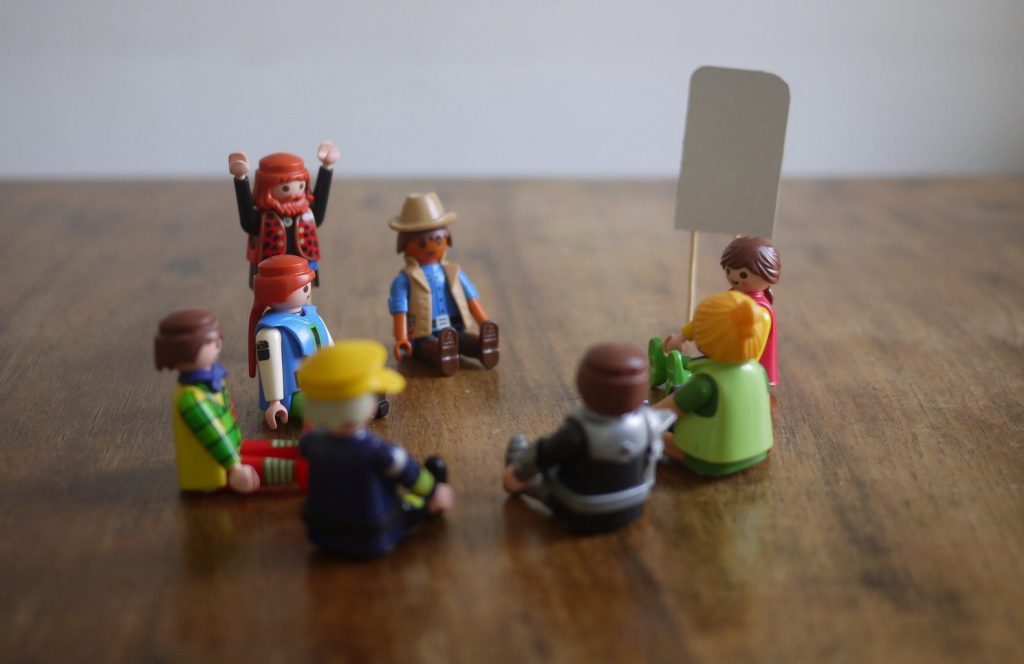My role as a trainer, part 2
Sometimes groups can be too much for the trainers themselves. Our case group is discussing in the park today whether this is something that can be shown or not. They are obviously in the storming phase again.
„I don’t think so!“ Yasemine seems genuinely upset. „You can very well admit to an insecurity sometimes.“ Rudi is also exceptionally excited by his standards. „But I can’t stand there and say ‚oh, I’m sorry, but you’re really intimidating me‘“ he shakes his head in annoyance. „That would be the opposite of professional!“
When Beate, Paul and Maria arrive, the tension eases a little. The three of them met by chance at the underground and have come together to the meeting in the park. Beate notices that something is wrong and immediately approaches Yasemine and Rudi about it. „I think I broke Rudi’s impulse question for today’s input.“ Yasemine looks a little embarrassed. „I’m really sorry for being so intense before, but with professionalism questions like that, I hit the ceiling really fast.“ Rudi shrugs. „Maybe we just have a different point of view.“ Beate, Paul and Maria look tensely back and forth between the two. „Now we’re curious,“ Paul says and adjusts himself on his picnic blanket.
Topic-centred interaction
Rudi clears his throat and begins, „Today’s meeting will be about what if the group makes me nervous as a trainer. Am I allowed to show that I’m afraid of the group, or do I have to be competent about it, even if I don’t feel that way?“ Rudi pauses briefly and then continues: „Yasemine said earlier that as a trainer you have to be open with your insecurities and that it helps the group a lot if you express them. For me, this is a total no-go. I think my personal insecurities have no place in a seminar!“
Yasemine immediately intervenes, „But that completely misses the point of the idea of topic-centred interaction. I am also part of the system and if something irritates me, I have to deal with it.“ Yasemine explains once again Ruth Cohn’s idea of topic-centred interaction, which looks at the topic, the group and the individual in equal measure. According to this idea, the leader is part of the group and makes her thoughts and feelings available, but does not lose the controlling role. She sees herself more as a catalyst, an element that often finds it easier than other group members to formulate observations or feelings.
Group session for the leader
„If you explain it like that, I understand your approach, of course,“ Rudi says, nodding. He had situations in mind where the seminar leader was unsettled by the group and then discussed it long and hard without any added value for the group being apparent. „That degenerated into group therapy for the trainer,“ Rudi shakes his head in annoyance, „and unfortunately I wasn’t brave enough back then to just leave.“ Paul can also give a few examples: He tells of trainers who ask the group with every new input whether this is right for them and who immediately overturn their concept every time someone clears their throat or grumbles. Everyone seems to know examples of trainers who did not come across as professional in their uncertainty. At the same time, there are also examples where a group has benefited greatly from the fact that the leader has addressed the irritation.
A gender issue?
Maria hasn’t said much yet today. Now she clears her throat and says: „Could it be that this is also a gender issue? I think that women are more often accused of showing their insecurities and men of trying to hide them. Female trainers are certainly confronted with the question of professionalism versus social competence or group competence more often than male trainers.“
Everyone in the group nods. The men share experiences where they have received astonished looks when they have made an observation about the group climate and the women share experiences where there was surprise because they did not address sensitivities but continued in the topic. Yasemine nods: „I think that’s why I got so upset when you said expressing insecurity was the opposite of professional“ – she looks at Rudi. „It’s just happened to me so many times that I’ve had to defend myself in that direction. Rudi nods: „I’m sorry about that. I guess that was actually a pretty stupid killer argument of mine.“
Leading against resistance
Beate takes a breath: „Well, this might surprise you, because I’m more of a specialist and don’t have much to do with group dynamics. I swore to myself that I would never do another seminar if I noticed that something wasn’t right in the group. I did it once and it was the most exhausting and longest three days of my life. I looked at my watch every half hour and the break wouldn’t and wouldn’t come“ – she shakes her head – „I’ll never do that to myself again. If I don’t fit in with the group and their expectations, I’d rather break off the assignment than drag the group along again like a dead horse. I lay flat for two days afterwards, I was so exhausted,“ Beate says, laughing. She actually earns astonished looks from the others, but basically everyone agrees with her: better a quick end than leading a seminar against resistance. That only costs everyone involved energy and rarely has much added value.
It slowly gets chilly in the park and the five decide to call it a day. Since the topic of conflicts would fit so well right now, they consider dedicating the next meeting to this topic. They agree that they would much rather see each other live than on video and the fresh air in the park has done them all good.
Authors: Gerda Kolb and Irene Zavarsky
Lust auf mehr? Zu allen Beiträgen der Serie kommst du HIER!

Dieses Werk ist lizenziert unter einer Creative Commons Namensnennung-NichtKommerziell-Weitergabe unter gleichen Bedingungen unter gleichen Bedingungen 3.0 Österreich Lizenz.
Volltext der Lizenz




